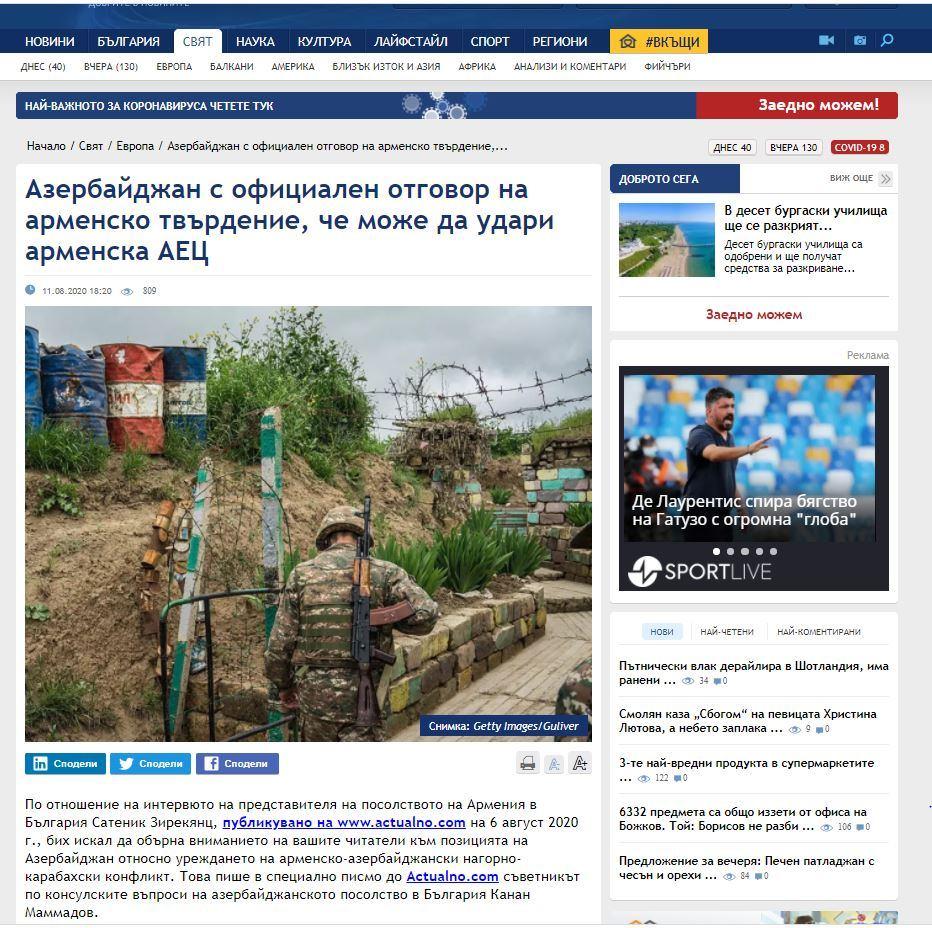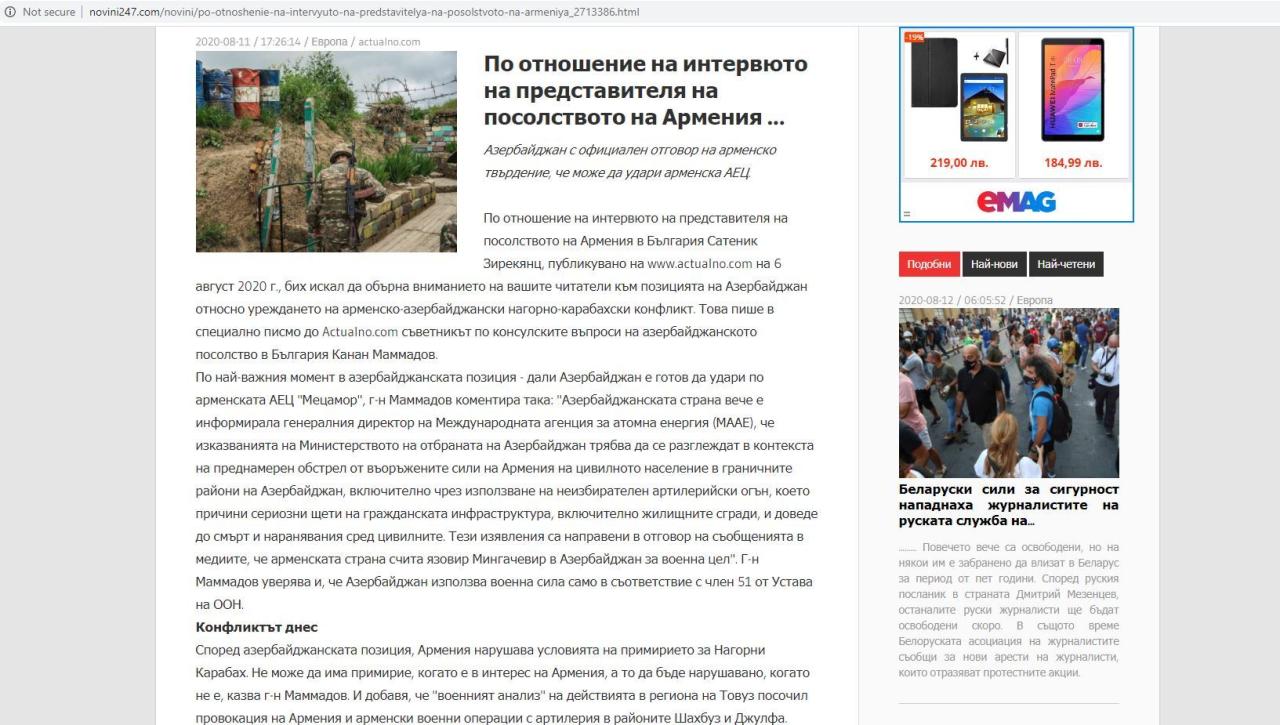Azerbaijani diplomats expose lies of Armenian embassy in Bulgaria [PHOTO]
![Azerbaijani diplomats expose lies of Armenian embassy in Bulgaria [PHOTO]](https://www.azernews.az/media/2020/08/17/bukkbwk1.jpg)
By Trend
The Azerbaijani Embassy in Bulgaria gave a well-grounded decisive answer to the false fabrications of the Armenian embassy in Sofia, a source in the embassy told Trend.
The Armenian embassy tried to misinform the Bulgarian public, distorting historical and legal aspects of the Armenian-Azerbaijani Nagorno-Karabakh conflict, said the source.
The representative office of the Armenia published "historical" assumptions and false conjectures about the creation of the Nagorno-Karabakh Autonomous Region, alleged "requirements" of international law on this issue and groundless statements in connection with the provocation committed by the Armenian side on the Azerbaijani-Armenian border, the source noted.
In response to this insidious and slanderous initiative, the Azerbaijani embassy in Bulgaria immediately contacted the relevant Bulgarian media and demanded featuring the position of the Azerbaijani side.
For this purpose, an official letter was sent to the media, which, in contrast to the representation of the occupying country, exposed their insidious intentions were in a reasoned and well-grounded manner with references to historical documents, the embassy added.
The vision of the Azerbaijani embassy regarding the distortions of Armenian side was published by Actualno.com, Club.bg and Novini247.com news agencies.
The embassy statement published in the Bulgarian media outlets said that on July 12, the Armenian armed forces attacked the positions of the Azerbaijani army in the direction of Azerbaijani Tovuz district with the use of large-caliber weapons and artillery.
The statement reads that the deliberate attacks on civilians in Azerbaijani districts along the border with Armenia resulted in serious damage of civilian infrastructure, including residential buildings, as well as a killing and injuries among civilians. The Azerbaijani side informed the international community about this incident, including the director general of the International Atomic Energy Agency (IAEA).
According to the statement, comments on the Metsamor nuclear power plant were made in response to reports spread in the media by the Armenian side that it considers the Mingachevir reservoir of Azerbaijan to be a military target.
The embassy stressed that Azerbaijani army has never attacked the civilian population or infrastructure, and only responded to an armed attack by Armenia, using their right to self-defense in accordance with Article 51 of the UN Charter, the statement also notes.
It was pointed out that with its latest provocation, Armenia showed that, being an occupying country, it is not interested in the settlement of the conflict.
The statement also highlights aggressive provocation efforts of the Armenian armed forces in the direction of Shahbuz and Julfa districts [of Azerbaijani Nakhchivan Autonomous Republics] . The statement of the embassy provides a military analysis of provocations in the direction of Tovuz district on the state border.
The statement stresses that the Armenia's claim about an alleged attack by the Azerbaijani armed forces on Armenian positions using a UAZ vehicle is absurd, because Azerbaijan could use powerful and destructive weapons from its arsenal for an attack, not the UAZ vehicle, the source said.
In response to fictions about "Great Armenia", it was noted that the State of Urartu, which existed in the 9th-6th centuries, was not a mono-ethnic state formed as a result of genocide and deportations against other peoples, like modern Armenia.
According to the source, by drawing attention to the origin of the Karabakh toponym and the establishing of the Nagorno-Karabakh Autonomous Region within the Azerbaijan SSR, the embassy proved, by solid arguments, that the region was located in a geographical area called Karabakh, and that the name of the country’s region is a combination of two Azerbaijani words.
The statement stressed that historically, this integral part of Azerbaijan, which will remain so, was not given to Azerbaijan, contrary to the statements of the Armenians, but was retained in its composition.
Creation of the autonomous region as part of the Azerbaijan SSR was not Stalin's personal decision, as the Armenians falsely assert. Such a decision was made by Caucasian Bureau of the Bolshevik Party, a collective body consisting of two Azerbaijanis, several Armenians and representatives of other nationalities, the statement reads.
The embassy reminded that the status of Nagorno-Karabakh as an autonomous region within the Azerbaijan SSR was enshrined in the USSR Constitutions of 1936 and 1977, and the autonomy had fundamental rights that ensured the needs and aspirations of the region's inhabitants.
Referring to the legal aspects of the Armenian-Azerbaijani conflict, the statement stressed that in accordance with Article 78 of the Constitution of the USSR, the borders between the Soviet republics, when the USSR was created, could be changed only by mutual agreement of the respective republics.
This clauseabout possible change of the border was included in the constitutions of both the Azerbaijan SSR and the Armenian SSR. In response to the appeal dated February 20, 1988, on the transfer of Nagorno-Karabakh from Azerbaijan to Armenia,the Supreme Soviet of the Azerbaijan SSR and the Supreme Soviet of the USSR considered it illegal and rejected on June 17 and 18, 1988, respectively.
The statement underlined that similar approach is also manifested in the policy of European states in relation to the independent states that arose after the fall of the Soviet Union.
In this regard, reference was made to the Declaration on the process of the Soviet Union’s disintegration adopted by the Council of Europe on December 10, 1991. According to the declaration paragraphs stressing the importance of respecting the provisions of the Helsinki Final Act, the borders of all European states are inviolable and can only be changed peacefully and by mutual agreement.
In response to Armenia's speculations over the right for self-determination, the statement brings attention to the fact that self-determination claims are invalid if they are accompanied by a violation of international law, in particular, peremptory norms (jus cogens) prohibiting the use of force or a threat to the sovereignty and territorial integrity of states.
Since it’s impossible to obtain territory by unlawfully using force, states are obliged to avoid legal recognition of the jurisdiction of the authorities of the illegally occupied territory, the statement said.
This position was openly declared by the UN International Court of Justice and is consistently observed in the practice of states. It’s noteworthy that resolutions 822 (1993), 853 (1993), 874 (1993) and 884 (1993), unanimously adopted by the UN Security Council, not only did not mention the "right for self-determination;" on the contrary, they strongly condemned the use of force against Azerbaijan and the occupation its territories, the embassy added.
The conflict between the two South Caucasus countries began in 1988 when Armenia made territorial claims against Azerbaijan. As a result of the ensuing war, Armenian armed forces occupied 20 percent of Azerbaijan, including the Nagorno-Karabakh region and seven surrounding districts.
The 1994 ceasefire agreement was followed by peace negotiations. Armenia has not yet implemented four UN Security Council resolutions on the withdrawal of its armed forces from Nagorno Karabakh and the surrounding districts.
--
Follow us on Twitter @AzerNewsAz


